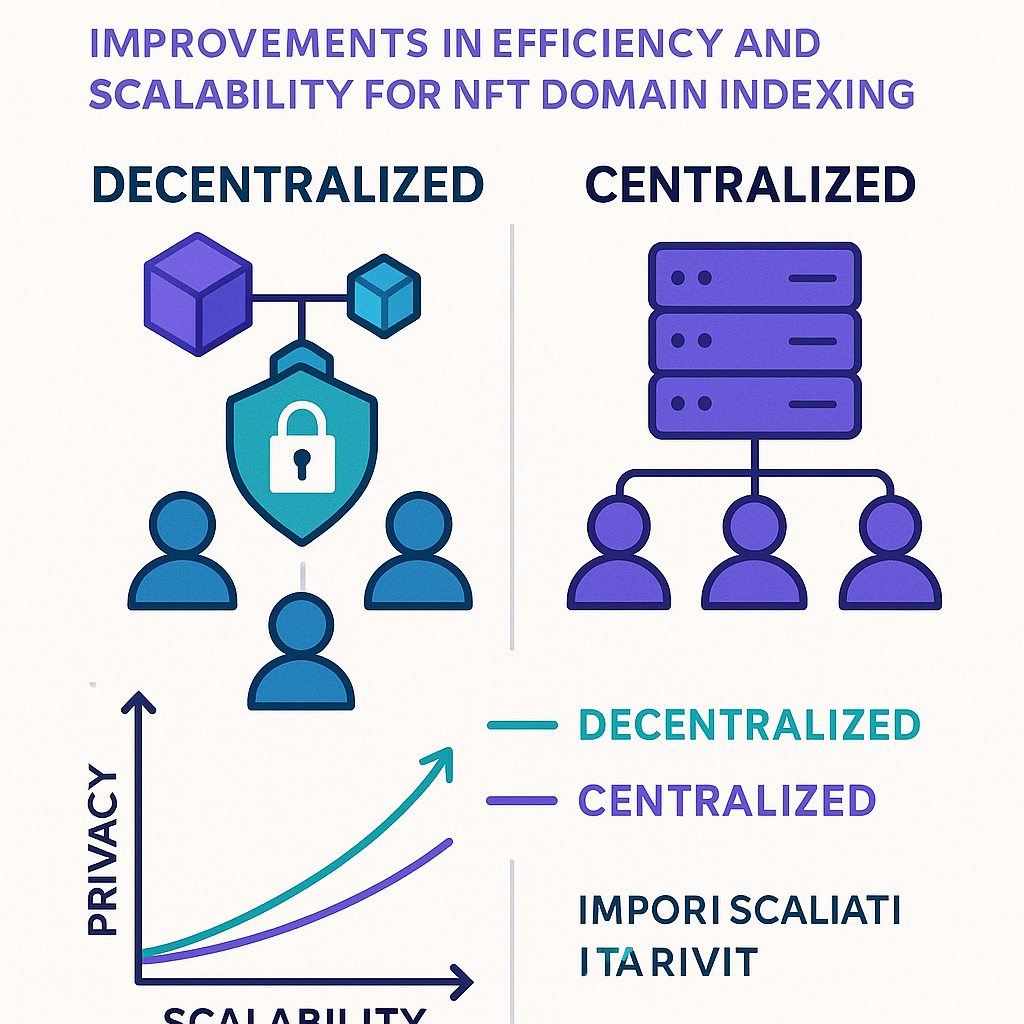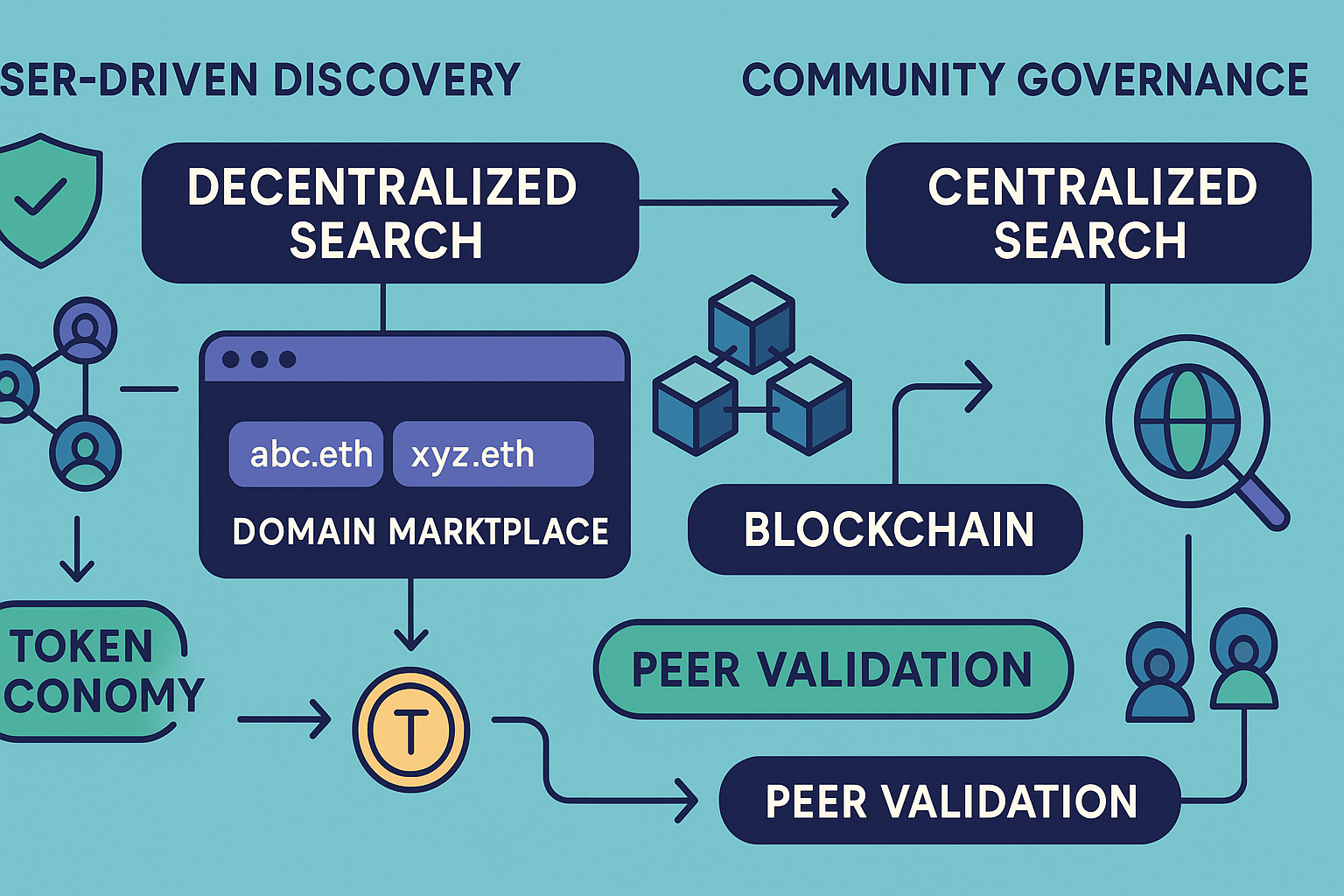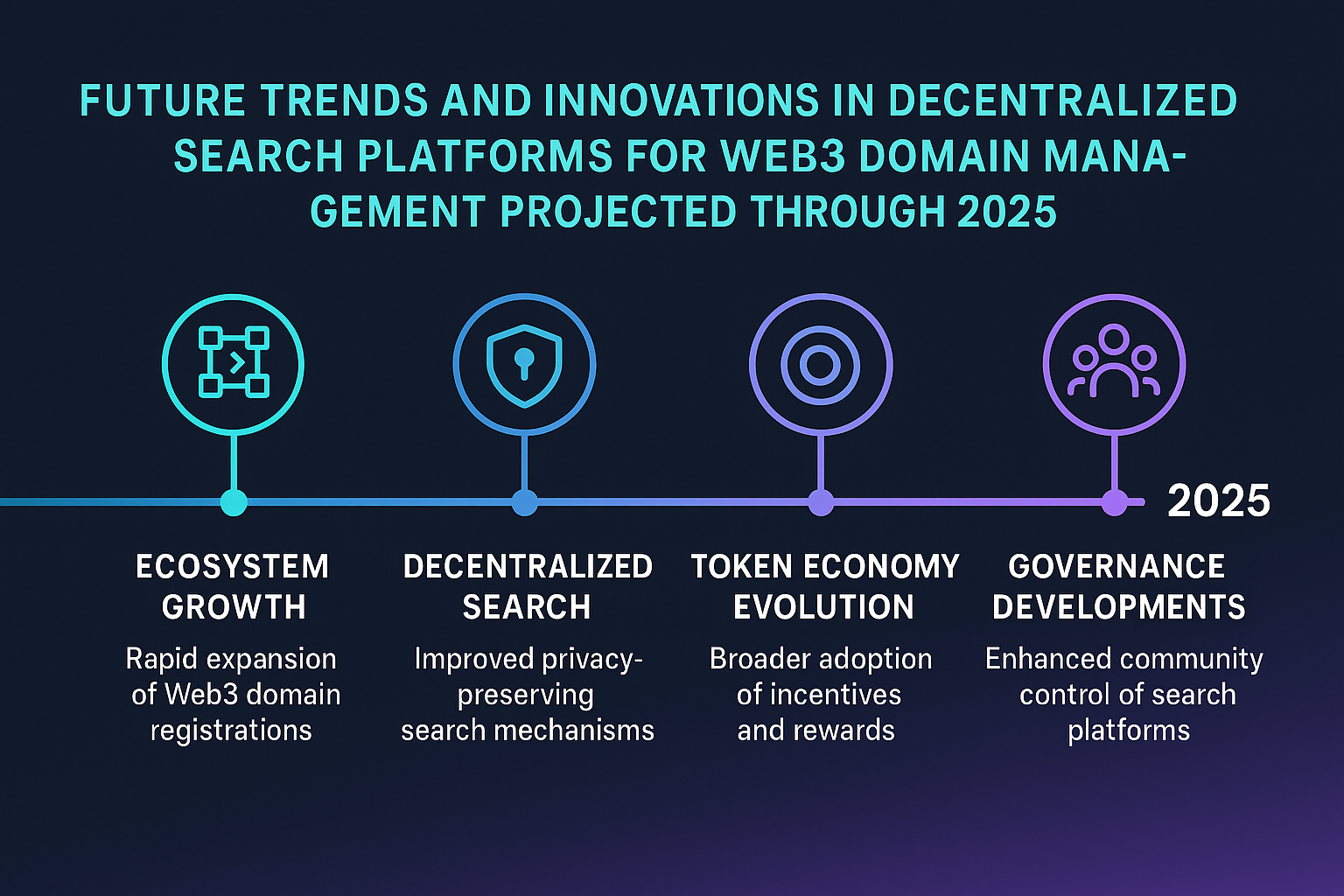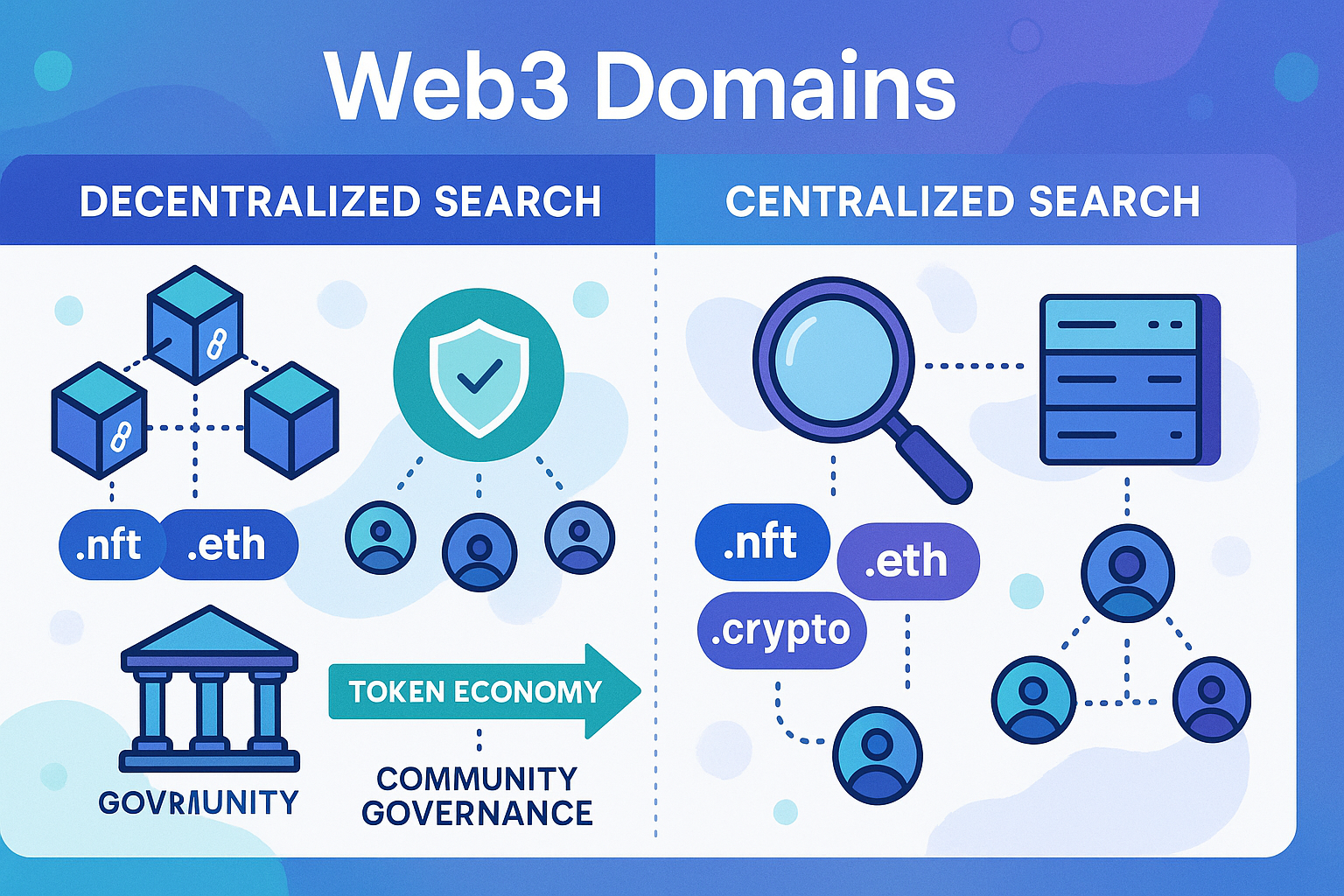- Introduction
- Decentralized Search Mechanisms
- Impact on Web3 Domain Discovery
- Using Decentralized Search Platforms
- Conclusion
- Resources
Introduction
In the rapidly evolving Web3 ecosystem, traditional models of search and domain discovery are being fundamentally reimagined. Decentralized search has emerged as a transformative force, promising not only enhanced privacy and censorship resistance but also a new paradigm where users truly control their digital identity and online assets. The conventional limitations of centralized domain systems—where large, corporate gatekeepers control access, data, and discovery—are being replaced by networks that empower individuals, promote transparency, and protect user sovereignty.
What is Decentralized Search in Web3?
At its core, decentralized search in Web3 is a shift from siloed, proprietary algorithms to peer-to-peer networks fueled by blockchain technology. Unlike classic search engines that aggregate and rank data on centralized servers, decentralized search engines leverage distributed protocols, allowing anyone to index, query, and validate content. This innovation transforms how users discover resources like Web3 TLDs and digital identities, and supports the broader vision of a more resilient and inclusive internet.
Decentralized search enables:
- User sovereignty over search data and results
- Censorship resistance thanks to distributed consensus
- Community-driven relevance through social validation and token incentives
- Seamless integration with decentralized apps and domain systems such as ENS
Importance of Decentralization for Domain Discovery
The transition toward decentralization is more than just a technical upgrade—it’s a philosophical pivot toward digital autonomy. Within the realm of domain discovery, decentralization protects users from third-party manipulation, enables privacy-first decentralized search practices, and ensures that owning a domain is not contingent on the policies of any one corporation. Through distributed systems and blockchain indexing, users enjoy:
- Ownership sovereignty: Domains can be minted, transferred, and managed without centralized approval.
- Enhanced decentralized privacy: User activities and searches remain anonymous, secured by blockchain encryption.
- Unparalleled security against domain seizure or censorship
Overview of Web3 Domain Ecosystems
The modern Web3 domain landscape includes several prominent protocols—ENS (Ethereum Name Service), HNS (Handshake), 3DNS, and emerging decentralized registry systems. Unlike traditional platforms (e.g., GoDaddy), these projects utilize blockchain for registration and management, allowing web addresses to double as verifiable digital identities. The result is a new ecosystem where users have true control, can participate in community governance, and benefit from evolving token economies that incentivize quality and trust.

Decentralized Search Mechanisms
As Web3 domains and decentralized identity gain momentum, understanding the mechanics of decentralized search engines becomes critical. These platforms incorporate innovative algorithms, advanced indexing methods for NFT domains, and the foundational role of blockchain—technology that collectively underpins the entire decentralized search experience.
Decentralized Search Algorithms
Decentralized search algorithms depart from the logic of traditional, centralized platforms, instead utilizing peer-to-peer networks, distributed hash tables, and overlay networks for content discovery. By employing robust consensus mechanisms, fault-tolerant distributed computing, and semantic search innovations, these systems:
- Increase search efficiency by distributing queries across multiple nodes simultaneously
- Prioritize semantic search innovations to deliver context-aware results tailored to user intent
- Employ privacy techniques such as zero-knowledge proofs to ensure decentralized privacy
- Use reward incentives—tokenized economic models—to validate and improve search quality through community inputs
Key technical results from recent research show that decentralized protocols offer superior resilience, scalability, and robustness compared to traditional algorithms (decentralized search algorithms). Systems like Tribler prove that it’s possible to operate large-scale decentralized, privacy-first discovery engines, paving the way for widespread adoption of this new search model (open source decentralized search).
Indexing NFT Domains
Indexing in decentralized systems differs fundamentally from legacy DNS approaches. While classic DNS relies on hierarchical, centrally controlled roots, NFT domain indexing harnesses distributed ledgers and community-operated nodes to build, update, and validate domain records in real time. This approach brings several advantages:
- Blockchain indexing: Every transaction or change in ownership is logged on an immutable ledger, promoting transparency and auditability
- Decentralized curation: Search results can be enriched by user-driven tagging, peer validation, and staking models
- Increased resistance to domain squatting or manipulation thanks to transparent NFT protocols (NFT domain indexing)
However, challenges remain, including issues of interoperability between blockchains, scalability of distributed databases, and latency in updating vast domain sets. Innovations in distributed systems and consensus algorithms are bridging these gaps, making decentralized indexing increasingly competitive (distributed systems).
Blockchain Role in Search Indexing
Blockchain technology is at the heart of secure, transparent, and censorship-proof search infrastructure. Every step of domain registration, update, or transfer is logged on a decentralized ledger, ensuring ownership is provable and unassailable. Among the main blockchain contributions to search indexing are:
- Trusted, immutable domain records that can be verified by anyone at any time
- Automated management of search and domain governance via smart contracts
- Transparent incentive mechanisms to reward contributors for indexing, curation, or dispute resolution
- Distributed access controls that preserve privacy while enabling collaborative management (blockchain technology)
Decentralized search built on blockchain thus delivers unmatched security, accountability, and genuine autonomy for all participants in the domain ecosystem.

Impact on Web3 Domain Discovery
The arrival of decentralized search is redefining how Web3 domains are discovered, managed, and understood. The shift has enabled a new generation of platforms that emphasize user empowerment, community governance, and sustainable token economies—all with the overarching goal of restoring control to domain owners and search users.
Benefits of Decentralized Search
The advantages of decentralized search for Web3 domain discovery are profound:
- Privacy and data sovereignty are enhanced, with search queries and index participation shielded from centralized logging (privacy-first decentralized search)
- Resistance to censorship, enabling domain discovery even in restrictive regimes
- User empowerment: Individuals can customize discovery parameters and curate content
- Incentivized participation through token rewards, resulting in higher quality search outcomes (token incentives)
This participatory model is fostering a more democratic internet, where users have a direct stake in how information is indexed, ranked, and accessed.
Over 30% of active creators and domain owners in the Web3 ecosystem are already leveraging decentralized search protocols for discovery, management, and monetization opportunities—reflecting a significant trend toward user-led infrastructure.
User-Driven Discovery Platforms
User-driven discovery platforms lie at the intersection of social curation, technological innovation, and economic incentive. These platforms crowdsource relevance and quality through features such as:
- Peer validation systems, where trusted community members upvote or flag domains (peer validation)
- Staking and affiliate programs enabling users to earn rewards for curating and surfacing valuable domains
- Transparent reputation layers that reward accuracy and penalize manipulation
- Emphasis on social signals—community voting, comments, and endorsements—to enrich ranking algorithms (user-driven discovery platforms)
Research highlights the unique power of community-led discovery: unlike opaque, corporate search algorithms, user-driven models incentivize honesty, diversity, and genuine value, while drastically reducing the risks of fraud or spam.
Community Governance and Token Economy
Decentralized search is inseparable from community governance and token economies. Leading platforms adopt DAO-like structures, token-weighted voting, and open-source governance protocols to balance inclusivity with operational efficiency. The key mechanisms powering these ecosystems include:
- Token incentives: Rewarding contributions, penalizing bad actors, and facilitating upgrades and dispute resolution (token economy)
- Transparent governance models that allow all stakeholders to influence development and content ranking (decentralized search governance)
- Community-driven roadmaps to ensure platforms evolve based on real-world user needs rather than top-down dictates (community governance)
These principles drive healthy ecosystems where every user is an active participant, not a passive consumer.

Using Decentralized Search Platforms
How can individuals, developers, and businesses harness the benefits of decentralized search for their Web3 domains? Platforms like Hashtag.it.com, NFT marketplaces, and pioneering open source decentralized search engines present a practical path forward.
Platform Features and Privacy
Decentralized search platforms are defined by their robust privacy, security, and user autonomy features:
- End-to-end encryption and private querying protocols safeguard user intent and activity
- Censorship-resistant architectures prevent unauthorized content suppression
- Decentralized privacy is ensured via anonymous routing, multi-layered encryption, and zero-knowledge proofs (decentralized privacy)
- Transparent, community-vetted update mechanisms guarantee platforms evolve responsively
These features make decentralized search engines an ideal choice for privacy-conscious users and organizations seeking censorship-proof domain management.
Managing Web3 Domains
Using decentralized search platforms for web3 domain management empowers users to:
- Easily discover, register, and transfer domains without intermediaries
- Leverage NFT marketplaces to buy and sell domains as digital assets
- Employ blockchain indexing for transparent, auditable tracking of ownership and activity
- Participate in affiliate and staking models to monetize their contributions and enhance domain visibility
With the maturation of these platforms, both beginners and seasoned Web3 adopters gain powerful tools to establish, control, and grow their digital presence.
Future Trends and Innovations
The trajectory of decentralized search is set to accelerate through 2025, propelled by:
- Expansion of semantic search innovations—AI-powered engines that interpret user intent, language, and context to deliver hyper-relevant results (semantic search innovations)
- Deeper integration between domains, wallets, and decentralized apps, making access seamless and interoperable
- Continuous improvements in scalability, efficiency, and fault tolerance—drawing from the latest innovations in distributed systems and federated blockchain models
- Growth of decentralized AI and cognitive search models for enhanced personalization
As a result, domain owners and everyday users alike will enjoy unprecedented control over their identities, privacy, and content in the digital world.
Conclusion
The rise of decentralized search marks a new era in Web3 domain discovery—one built on privacy, user empowerment, and censorship resistance. By embracing blockchain-based approaches, next-generation algorithms, and community-driven governance, decentralized search platforms offer domain owners unmatched security, transparency, and self-sovereignty.
Recap of Decentralized Search Benefits
Decentralized search provides:
- Genuine privacy and ownership for users
- Censorship-resistant discovery of domains and content
- Participatory models that reward users for improving the ecosystem
- Transparent, auditable records for every domain transaction and update
Future Outlook for Web3 Domain Discovery
Looking forward, decentralized search will continue transforming how we find, manage, and validate digital identities and assets. As AI, blockchain, and community governance models evolve, platforms will become more interoperable, privacy-centric, and user-driven—ensuring broad, equitable access to the internet’s full potential.
The token economy, transparent governance, and relentless push for privacy will define the future of domain discovery. Now is the time to embrace these innovations and stake your claim in the next generation of the Web.
Explore decentralized search platforms to empower your Web3 domain discovery and management today.
Resources
- The Expanding Ecosystem of Web3 TLDs: From .eth to .dao, What’s Next?
- Web3 Search Engine Can Reshape the Internet’s Future
- An Analysis of 3DNS, ENS, HNS, and GoDaddy
- Decentralized Trustless Systems: Blockchain Fundamentals
- Applications of Blockchain for Secure Data Management
- Decentralized Privacy and Data Sovereignty in Web3
- Advances in Distributed Systems for Decentralized Architectures
- Decentralized Search Engine for Web3 – Privacy First & Semantic Search
- Decentralized AI Memory: SHIMI, a Semantic Hierarchical Memory Index for Scalable Agent Reasoning
- Token Economy and Decentralized Search in 2024
- Decentralized Search Engine Governance Models
- Open Source Decentralized Search Projects

Leave a Reply